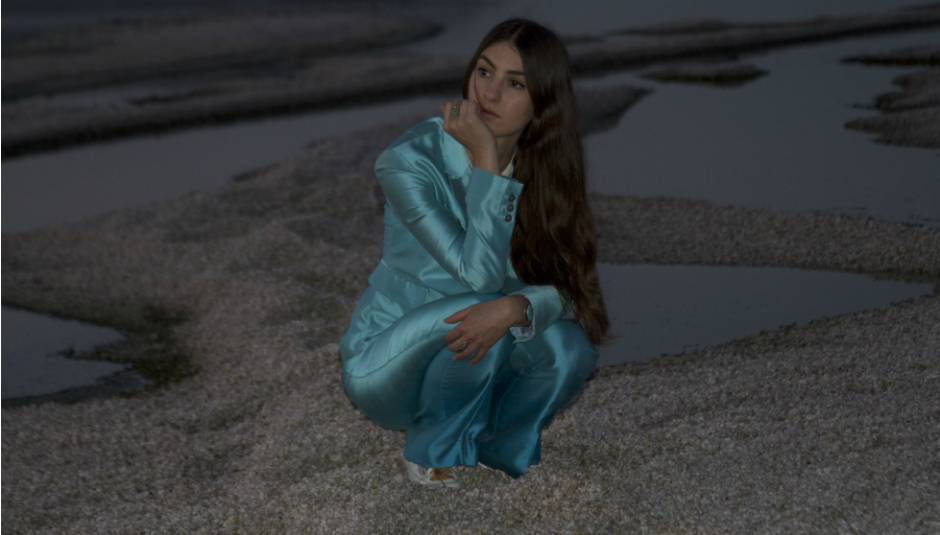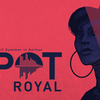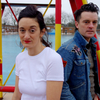Most of us recognize those murals of hunters and creatures from the prehistoric age: a beautifully abstract but crude documentation of a time where man and womankind lived on a more equal footing with the laws of nature. It feels mythical, and in some ways, these ancient images might’ve played a part in our perpetual fixation with myth and fiction.
That’s exactly how Weyes Blood’s music envelopes the listener: as a surreal depiction of the everyday, laced with a hazy West Coast folk reverie. Natalie Mering is in Rotterdam with her band to perform at Motel Mozaïque Festival where, in the afternoon, she does a short but fantastic session for Dutch music platform 3voor12. Mering glows like a pristine-looking chimera on stage, poker-faced and fully immersed. Briefly, during ‘Do You Need My Love’, a slender but wicked smirk forms on her face, the very instant before hitting a deeper, more sinister note on her keys. It’s a microcosm of her music: that first ominous tear in a canvas of idyllic seashore bliss.
Weyes Blood is one of the few artists who cleverly debunks the concept of nostalgia as merely some naïve escapist sentiment. "It's not the past that scares me", is just one probing line on her haunting 21st Century lament 'Generation Why'. Someone who can sing the coy millennial phrase ‘YOLO’ in such a straight-faced, fervent manner must have a playful streak that counterpoises the majestic and monumental. That said, ‘’majesty and monumental’ are the kind of superlatives the latest LP Front Row Seat To Earth reaches for in droves. But even as the songs double down on that, Mering’s noise leanings always signify that rude awakening. It’s just becoming increasingly subtle and clandestine.
Listening back to our chat, I am reminded of one of my favorite scenes in one of my favorite movies, Jaws. Matt Hooper and Chief Brody try to convince Mayor Vaughn to close the beaches again, but all he cares about is apprehending the “sick vandalism” of Amity’s Billboard Banner. So much for that naïve escapist sentiment.
As I type this, I’m left to wonder if one of the culprits was actually called Natalie.
DiS:Front Row Seat To Earth bookends with a soundscape/ambient track ‘Front Row Seat’. Why end the record on such an experimental note?
Natalie Mering: I wanted to keep true to my roots, which is more noise/sound collage stuff. But also the rest of the sounds on the planet didn’t make it into the songs. A little bit of field recordings, a little bit of sound effects here and there. But nothing quite as total and complete, so I had to put the last track in as a cap to the end of the show. You hear people running around chatting. There’s a huge water splash, and the theme of ‘Do You Need My Love’ played on horn, like a reprise, to bring it all back together. It’s a beautiful melody.
I immediately zoned in on that splash and scream, as I instantly recognized it. It’s from, Jaws. Did you use that recording deliberately?
I used it deliberately, yeah. I love that movie. Jaws is also heard on the beginning of ‘Be Free’. But yeah, it was just a good scream! I was originally looking into the Jaws soundtrack for the “dum-dum” [hum’s the ominous Jaws theme], and then I realized the splash and the scream was of great use.
Jaws made people afraid of the ocean. Was that the same with you when you watched that movie for the first time?
Definitely, I was scared to take a bath even. I thought a shark was just going to come out of the bathtub and grab me.
I’m asking this because there’s a lot of water imagery in your music and your videos. ‘Seven Words’ features you as a mermaid. You’ve stated in numerous interviews how fond you are of the ocean. What are your earliest memories of the ocean?
I grew up near the coast, so I was going into the ocean since I was a baby. I learned how to swim in the ocean. My earliest memory is probably getting in the water and learning how to deal with the waves crashing. I figured you can dive underneath the wave and miss all that crazy chaos, dig your fingers into the sand. You can hear the waves crash above you, but you’re safe in this tiny little pocket of space at the bottom.
Jaws made villains out of sharks, but as you grow up, you learn they are just a potent force of nature. Your music kind of reminds me of that sentiment, not so much taking the side of good or evil. How do you pay heed of music as a force of nature instead of something with an agenda?
It’s all part of it for me because I’m a nature person. I feel a deeper connection with nature than with civilization. The instinctual voices of animals get a bad rep for being unsophisticated. But they’re actually very complex. If anything, it’s humans who lack the sophistication to understand what their place on the planet could be. Like a keeper, a tender, somebody that could take care of these ecosystems as opposed to destroying them. Like anything else, we as a species have never been as smart as we thought we were. We can build bridges, we figured out how to fly, we figured out how to feed the First World. But we haven’t even figured out yet how to feed everyone on the planet. But we figure some stuff out. That doesn’t mean we’re deeply intelligent in ways that are objective and omnifarious.
You grew up in a Christian household. Did you have ample room to find your own values and identity being exposed to pop culture, movies, music and such?
Yeah, there were certain things we weren’t allowed to see. But we saw Jaws on cable television. I was a little bit scared at first, but then I got over it because I love the ocean so much. And there are not that many shark attacks in Southern California. If you actually read into what Jaws is based on, it’s about a series of shark attacks that happened in 1916 when there was this weird heat wave, which caused all these sharks to be pushed into New Jersey waters. So there was an excess of sharks there. People were dying because they didn’t have the medical capacity there to deal with shark attacks.
Film is still very young when you think about it. Less than a century old even. I think we’re only now starting to comprehend the long-term after-effects of relating deeply to movies.
I’ve been thinking about this stuff a lot. I actually had a rebellion against movies because I was so informed by them. They had such a big effect on me. When I was twelve years old I decided for myself that I didn’t want to watch any more TV-shows or movies. I would banish them from my life because they weren’t real. Because I knew they were replacing myths. Humans throughout history always had myths and stories that everybody shares. And archetypes in those stories that they all identified with. Humor and tragedy always existed, and once movies came along we bastardized the genre of the myth. Our myths became more fleeting and driven by capitalism. That’s what happened to the music industry as well. It all started with making a movie that was either good or thoughtful, with some kind of moral implication. Now we just want to make movies that make a lot of money. That shift really bastardized the whole idea that human beings are myths, in many ways like a religion. So I took a break from movies for almost two years, because I was so upset by that influence. But then I got back into them again!
So you developed and maintained a healthy skepticism?
Yeah, I was really skeptical. Because movies had a huge impact on my childhood. I grew up in Los Angeles, I wanted to become an actress. I was near Hollywood and I could always feel that presence near me and I identified with it. When I realized I was being injected with 'feel good' bullshit that wasn’t real, I got really upset.
You being brought up with Christianity, I don’t have to tell you natural disasters are often depicted as the wrath of God. Once a person survives, it’s because God had mercy. Have you ever been in a hurricane, earthquake or a tornado yourself?
I was in Hurricane Sandy and I was in an earthquake once. The earthquake was really freaky. I had a friend over so I was sleeping on the floor of the room. And the drawers of my dresser shook out. Because of the movie Backdraft, I remember thinking strips of fire were going to blast out of the hallway. It was very scary, I slept in my parents' bed. But I couldn’t sleep that night. I wasn’t scared when Hurricane Sandy happened. I was in Brooklyn and I was mostly in awe with how strange it was. Because it wasn’t raining, but this dark ominous orange haze was over everything, swirling in the distance. It seemed strangely still.
But yeah, I think the human brain and the way we function mentally is definitely predisposed to a certain belief system. It helps people get through the kind of strange melees within the indifference of nature. To believe there is a force beyond us that we can tap into and have faith in. You know, a benevolent force, not just the chaos, not just the darkness.
Maybe you can put our reliance and addiction on tech in a similar context. Is it true that your album doesn’t pick a side there, especially your song ‘Generation Why’?
I think the positive aspect of technology is this: it instinctually shows people yearn to be connected to one another. It shows that people are not meant to be isolated as individuals; we’re meant to be in clusters, in hives, in tribes together. The phone just taps into that human instinct. That’s why it’s such a successful piece of technology. The downside is that it’s a flawed piece of technology perverted by capitalism, Facebook, and digital algorithms. Based on advertising, designed to make people envious of one another, not in that good, benevolent ‘help thy neighbor’-way. It also reveals this anonymous hate that can be expressed without any repercussions. So it exposes this dark underbelly as well. I think that that’s ultimately a good thing, though, another process in our evolution. It’s like when we first started standing upright, we might’ve felt kind of awkward about it initially. We couldn’t adjust to it very well, and now we’re first discovering how to create these external modes of staying connected. They’re pretty awkward and not doing so great now. It’s a flawed technology because we’re flawed people.
Like a drug disguised as a coping mechanism? Maybe being on the tech-drip has a similarly positive spin on our psyches. Since we were talking about movies: your perspective here somehow reminds me of that movie Melancholia by Lars Von Trier. The main character played by Kirsten Dunst was able to cope with an end-of-the-world situation because of her depression.
Yeah, I love Melancholia. That’s a scary movie… I love that Von Trier uses a lot of Wagner in his movies as well. I love Wagner. I don’t like Wagner’s politics, but I love his melodies. I feel he writes the most beautiful, bombastic, and emotional classical music.
With politics, do you mean Wagner is now associated with the Nazis?
Exactly. I don’t agree with anything personally, I just thought the way the piece Tristan and Isolda was used in Melancholia was particularly stunning.
Maybe Wagner is just as misunderstood as Jaws.
Oh, yeah, he’s definitely a Jaws.
You met Lou Reed at an Occupy Protest. I’d like to hear that story.
I’ll never forget that day. I was walking away from the protesters dressed as a zombie carrying a weird sign. Lou Reed came up to me and told me ‘How’s the protest?’ Then I held up my hand to shake his hand, but my hands were cold, so he started warming them. Which is crazy, because he wasn’t known as a nice person. He’s been mean to a lot of people, but he was so nice to me. I happened to have my record in my car, grabbed my first album The Outside Room and I gave him a copy. We just smiled at each other, I felt deeply connected to him. He’s one of my favorite artists of all time. That was a huge moment for me, I’ll never forget it. I feel so blessed that I got to meet him before he died.
And at a historic event no less.
I also met Ezra Koenig there, the singer of Vampire Weekend.
Do you still protest?
I feel like such an ass because I’ve been on tour so much, I haven’t been able to attend the recent ones. But I protest in other ways. I feel my protest reveals itself pretty exclusively through my art and my videos and things like that. It’s difficult because I’ve been getting into this guy Adam Curtis lately. He’s this BBC documentary filmmaker who recently made a film called Hypernormalisation, which is all about how protesting and making art is not really helping the situation. He has this theory about how it’s actually distracting smart and brilliant people from doing what they need to do to really change things. I’ve been thinking about that a lot. And thinking about ways to be a more direct route to change things versus the idea that indirectly, my art is powerful enough to change things politically. Which I think is a myth created by punks in the 70s.
Can you elaborate on that?
Well, it’s in the documentary. But his argument is; when people left the political world to make art for each other in warehouses, in an elite self-referential scene, they missed the opportunity to stay relevant in the mainstream. And then the mainstream just continued to mechanize, and gradually became more a machine based on money. An exploit of capitalistic ventures. People ended up making a lot of money off of punk and grunge. You can see it now in that Pepsi commercial everyone’s been flipping on about. That’s the quintessential example of how that alternative culture of protest is being appropriated and not actually doing what it’s setting out to do.
Maybe we’ll see the Pussy Riot balaclavas in a Sears catalogue someday.
Well, it’s an entirely different story in a country like Russia though. That’s the same with the tropicalia bands of South America. In America, punk bands are not going to jail.
You just talked about music not being functional anymore to incite some sort of change. Do you still feel you have a mission as an artist? Or is it purely a romantic thing now?
I wouldn’t want it to be about anything else. When music is casual and simple without addressing all this heavy stuff, it can be nice sometimes. But I have so much empathy, so many feelings about what’s going on around me, I can’t just stop talking about that stuff.
Are you okay with being pigeonholed within that nostalgic West Coast scene?
I don’t mind. I realize I occupy a very nostalgic zone. I like it. Nostalgia is in vogue because everything got so fucked. Music got pretty bad. There’s some good stuff out there for sure. Hip hop got a lot better. But rock died, and songwriting kind of died. And these things happened because capitalism strangulated some of the essence within these art forms. So inevitably, people tend to look further back in time again. It’s also a myth that we’re all supposed to change every ten years. That whatever’s in style is supposed to become the next big thing, that music has to keep evolving. There’s nothing new under the sun. The baby boomers are still alive, so it’s not like that stuff is dead. It’s not like we’re being nostalgic for the 70s because the 70s are still here; there have just been a couple of layers of cheap paint slapped on top of it.
What’s in the cards for you in the near future?
Well, I have a new record I’ve been writing, and I’m finding some people I want to work and record with. I’m going to have Chris Cohen play drums again, my friend Kenny (Gilmore) will play bass again and mix it. So I’m keeping some of the same people on board, but I’m going to find a new studio situation. I have new songs, new ideas, it’s all a little more refreshing. I’m very excited about it.
So do you see yourself doing this when you’re old? Or are you going to shapeshift into something else, tread different waters?
You know, I thought about that. I think I’m going to pull a Lou Reed and do this forever!
Front Row Seat To Earth and Myths 002 (featuring Ariel Pink) are both out now via Kemado Records/Mexican Summer. Weyes Blood will play Primavera Sound on May 31st. For more information and further tour dates, please click here.
Photo Credit: Katie Miller






















